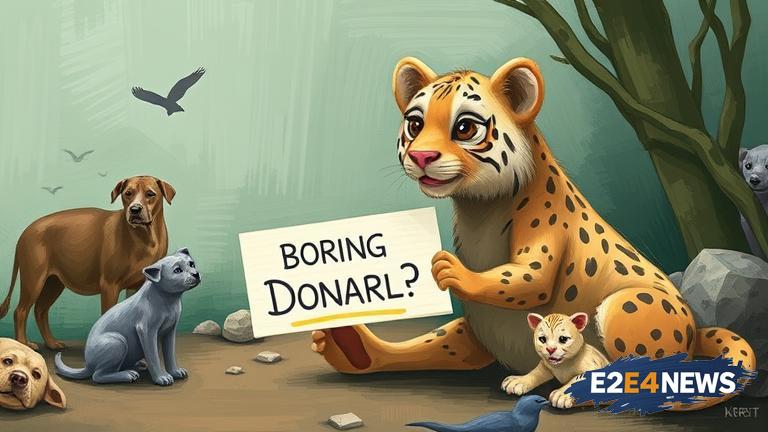In a move that has left many animal lovers and experts stunned, a zoo in Denmark has made a public appeal for people to donate their small pets, such as rabbits, guinea pigs, and hamsters, to be used as food for the zoo’s captive predators. The zoo claims that this initiative is part of their efforts to provide a more natural and varied diet for the animals in their care. However, the request has sparked a heated debate about animal welfare and conservation, with many questioning the ethics of using domesticated pets as food for wild animals. The zoo has argued that the donated pets will be used to feed the predators in a way that mimics their natural hunting behavior, and that this will help to promote a more realistic and immersive experience for visitors. However, critics argue that this approach is unnecessary and inhumane, and that it could potentially harm the animals involved. Some have also raised concerns about the potential health risks associated with feeding domesticated animals to wild predators, as they may not have the same nutritional profile as the animals’ natural prey. Despite the controversy, the zoo has reported that they have already received several donations, including a number of rabbits and guinea pigs. The zoo has assured the public that the donated animals will be handled and euthanized humanely, and that their remains will be used to feed the predators in a responsible and sustainable way. However, many are still calling for the zoo to reconsider their approach and explore alternative methods for providing a varied and nutritious diet for the animals in their care. The debate has also sparked a wider conversation about the role of zoos in modern society, and the ethics of keeping wild animals in captivity for the purposes of entertainment and education. Some argue that zoos play a vital role in promoting conservation and educating the public about the importance of protecting wildlife and their habitats. Others, however, argue that zoos are inherently cruel and that they should be phased out in favor of more humane and sustainable approaches to conservation and education. As the debate continues to rage, the Danish zoo at the center of the controversy has remained defiant, insisting that their approach is necessary and justified. However, it remains to be seen whether the zoo will be able to weather the storm of criticism and continue with their plans to use donated pets as food for the captive predators. The incident has also raised questions about the regulation of zoos and the laws that govern the treatment and welfare of animals in captivity. In Denmark, zoos are subject to strict regulations and guidelines, but some have argued that these laws do not go far enough in protecting the welfare of animals. The controversy has also sparked a reaction from animal welfare organizations and conservation groups, who have called for a rethink of the zoo’s approach and a greater emphasis on animal welfare and conservation. As the situation continues to unfold, it is clear that the debate over the Danish zoo’s pet donation request will have far-reaching implications for the way that we think about animal welfare, conservation, and the role of zoos in modern society. The zoo’s decision has also been criticized by some as being insensitive and disrespectful to the animals involved, and has sparked a wider conversation about the need for greater empathy and understanding in our treatment of animals. Ultimately, the controversy surrounding the Danish zoo’s pet donation request serves as a reminder of the complex and often fraught relationships between humans and animals, and the need for a more nuanced and informed approach to animal welfare and conservation. The incident has also highlighted the importance of education and awareness-raising in promoting a greater understanding of animal welfare and conservation issues, and the need for a more informed and empathetic public discourse around these issues. As the debate continues to rage, it is clear that the Danish zoo’s pet donation request will have a lasting impact on the way that we think about animal welfare, conservation, and the role of zoos in modern society.





